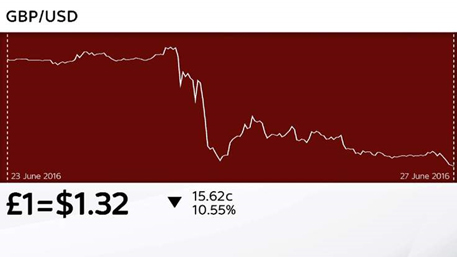
June 28th, 2016

The pound hits a 31-year low, down by more than 3% as more than £61bn is wiped off the value of the UK's top 350 listed companies
17:28, UK, Monday 27 June 2016

The pound reached a new low on Monday
Steep falls for banks, airlines and housebuilders dragged the FTSE further into the red as the Brexit sell-off continues.
Sterling reached a 31-year low against the dollar, below Friday's nadir, at $1.31. It fell more than 3%, on top of the plunge of up to 10% witnessed after last week's referendum.
The FTSE 100 closed 156.5 points, or 2.6% lower, at 5982.2, wiping £41bn off the value of its constituent companies and crucially falling below the psychologically important 6,000 mark.
The FTSE 250, which is a better indicator of the health of UK businesses than the more global FTSE 100, fell even more sharply. It closed 1120.2 points, or 7% lower, at 14967.9, wiping £22bn off the value of its constituent companies.
It means that more than £60bn has been wiped off the value of the UK's biggest 350 listed companies today.
Bank and property stocks continued to be hammered as investors singled out the sectors most likely to be hit by leaving the EU.
The biggest FTSE 100 fallers were: easy Jet down 22.3%, house builder Barratt Developments down 19.4%, Barclays down 17.3% and Wickes owner Travis Perkins down 16.8%.
Trading in RBS and Barclays shares was suspended briefly after falls of more than 10%.
RBS closed trading down 15.1%, which will make the government's target for revenue from its sale practically impossible. Given Monday morning's stock movement, the taxpayer's entire 73% stake in the bank is now worth less than £18bn.
Top FTSE 100 risers were silver and gold producers Randgold Resources (up 9%) and Fresnillo (up 7%) as market volatility drove up the price of safe-have precious metals.
After the Chancellor George Osborne intervened early on Monday in an attempt to limit further turmoil - saying he would do everything he could to make Brexit work for Britain, his efforts to calm the markets have proved fruitless.
He admitted that while it would not be plain sailing in the days ahead, Britain's financial system would help to prevent further shocks and there would be no rush for the EU exit without a clear plan.
On Friday, the pound slumped to its lowest level since 1985 after initially climbing steeply on the back of early suggestions that Remain would win.
Global stock markets lost about $2tn in value . The FTSE 100 fared better than most - closing 3.2% down on Friday.
German Chancellor Angela Merkel told her party's board that as far as the markets were concerned, the EU no longer seemed governable.
Hong Kong stocks lost ground in the first few minutes of Monday's trading. The Hang Seng Index fell 1.36%, or 276 points but Tokyo's Nikkei 225 index was up 2.34% - having dived nearly 8% on Friday in its biggest one-day plunge since Japan's 2011 earthquake-tsunami disaster.
Japanese Prime Minister Shinzo Abe held an emergency meeting with top officials in the morning to discuss Brexit and how to deal with the market fallout amid a fresh rush for the safe haven yen.
Japan could intervene in a bid to bring down the value of its currency if it is seen as too much of a threat to its export-led economy.
Christine Lagarde, managing director of the International Monetary Fund, said that what happens next depends on how policymakers handle the fallout in the coming days.
Economic risks, she said, depend on the level of uncertainty.
"How they come out in the next few days is going to really drive the direction in which risk will go."
George Soros, the billionaire famed for netting $1bn for himself and his investors by betting against the pound in 1992, said he did not speculate against sterling ahead of the EU vote.
He had warned then that the pound could fall as low as $1.15 in the event of a Leave vote.
Click on Link:
http://news.sky.com/story/1717973/pound-reaches-new-low-on-brexit-fears







